17 Network Administrator Resume Examples
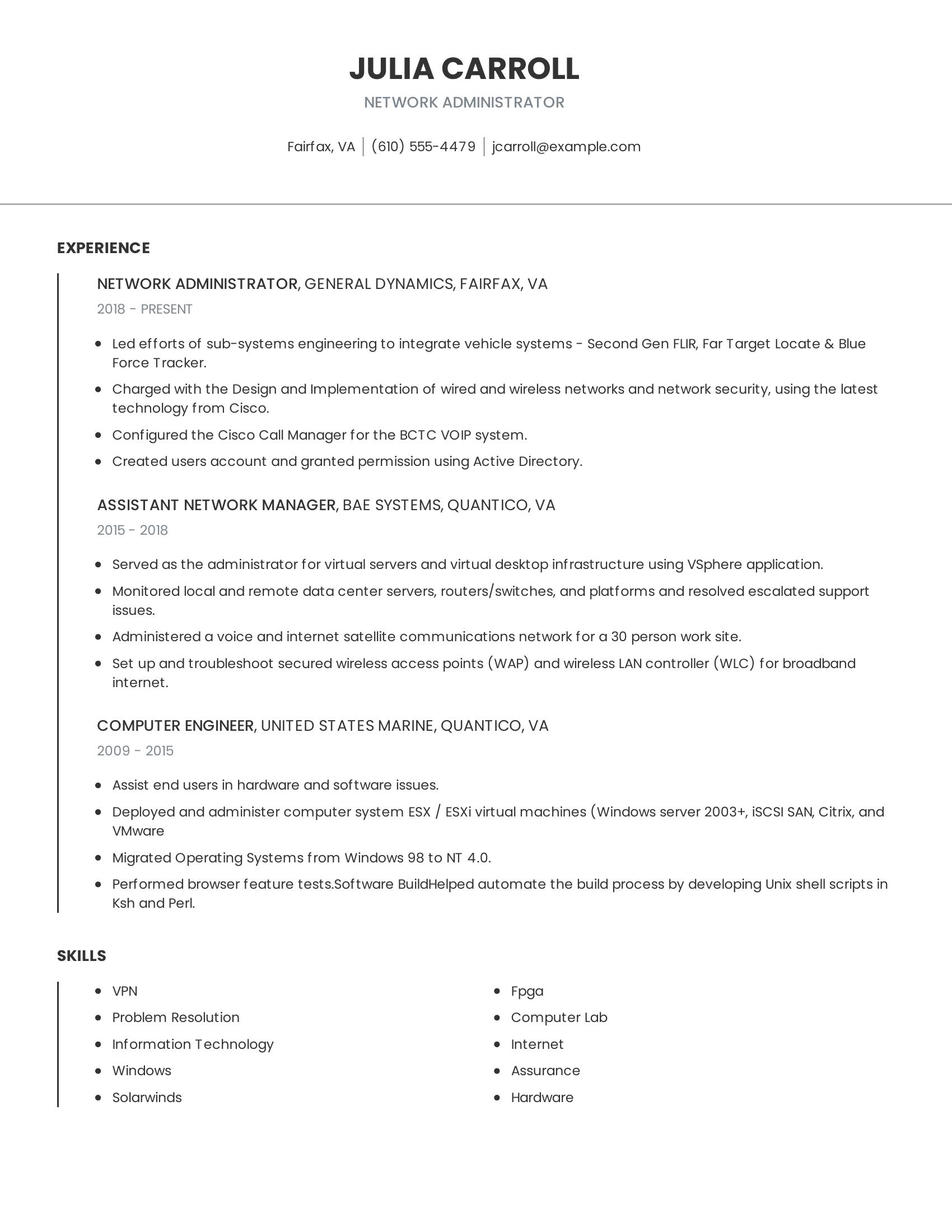



A network administrator resume should highlight relevant work experience, technical skills, and specific job responsibilities. It should include clear job titles, company names, locations, and dates of employment. Key areas to focus on are network design and implementation, troubleshooting, and experience with specific technologies like Cisco or VMware. Educational background and certifications can also be beneficial.
This resume includes specific job titles like network administrator and assistant network manager. It mentions key responsibilities such as designing networks, configuring Cisco Call Manager, and administering virtual servers. The resume also lists relevant skills such as VPN, problem resolution, and hardware knowledge. The work experience is detailed with clear timelines and specific duties performed at each job.

Network support administrator resumes should include a clear summary of technical skills, relevant work experience, and education. Highlighting specific technologies and systems managed, such as Red Hat Cluster Suite and Veritas Cluster Server, is important. Additionally, outlining responsibilities like resolving technical issues, supporting field technicians, and maintaining network documentation shows practical experience in the field. Including past roles that demonstrate a progression in responsibilities and expertise in network support is also beneficial.
This resume includes essential elements for a network support administrator. It details experience with specific technologies and systems, such as Linux and Solaris servers. The resume also highlights problem-solving skills and support roles, showing hands-on experience with network challenges and user support. The inclusion of educational background in computer science rounds out the resume by providing a foundation of formal training in the field.
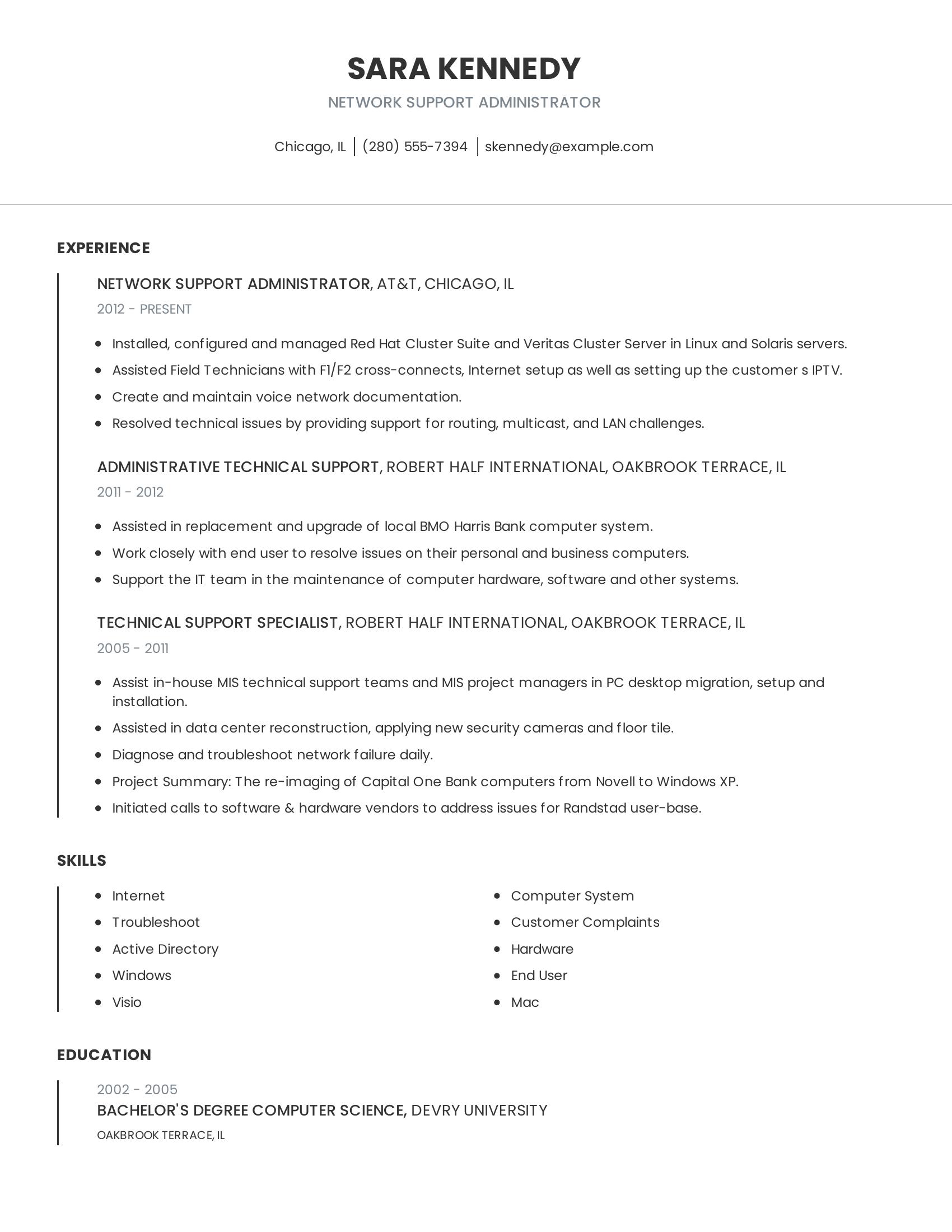
Network technician resumes should highlight relevant work experience, technical skills, and educational background. Key elements include detailed job responsibilities, specific technical proficiencies, and any certifications or degrees. Clear and concise descriptions of past roles, emphasizing hands-on experience with network infrastructure, troubleshooting, and user support, are important. Including measurable achievements or specific projects can also enhance the resume.
This resume includes specifics such as experience with Windows server, negotiating contracts for network infrastructure, and providing Tier 1 desktop support. It lists various technical tasks like replacing hardware components, diagnosing issues, and migrating users to new operating systems. The resume also mentions skills in configuring and testing IT systems, as well as a background in business education. These elements collectively demonstrate a broad skill set relevant to the network technician role.
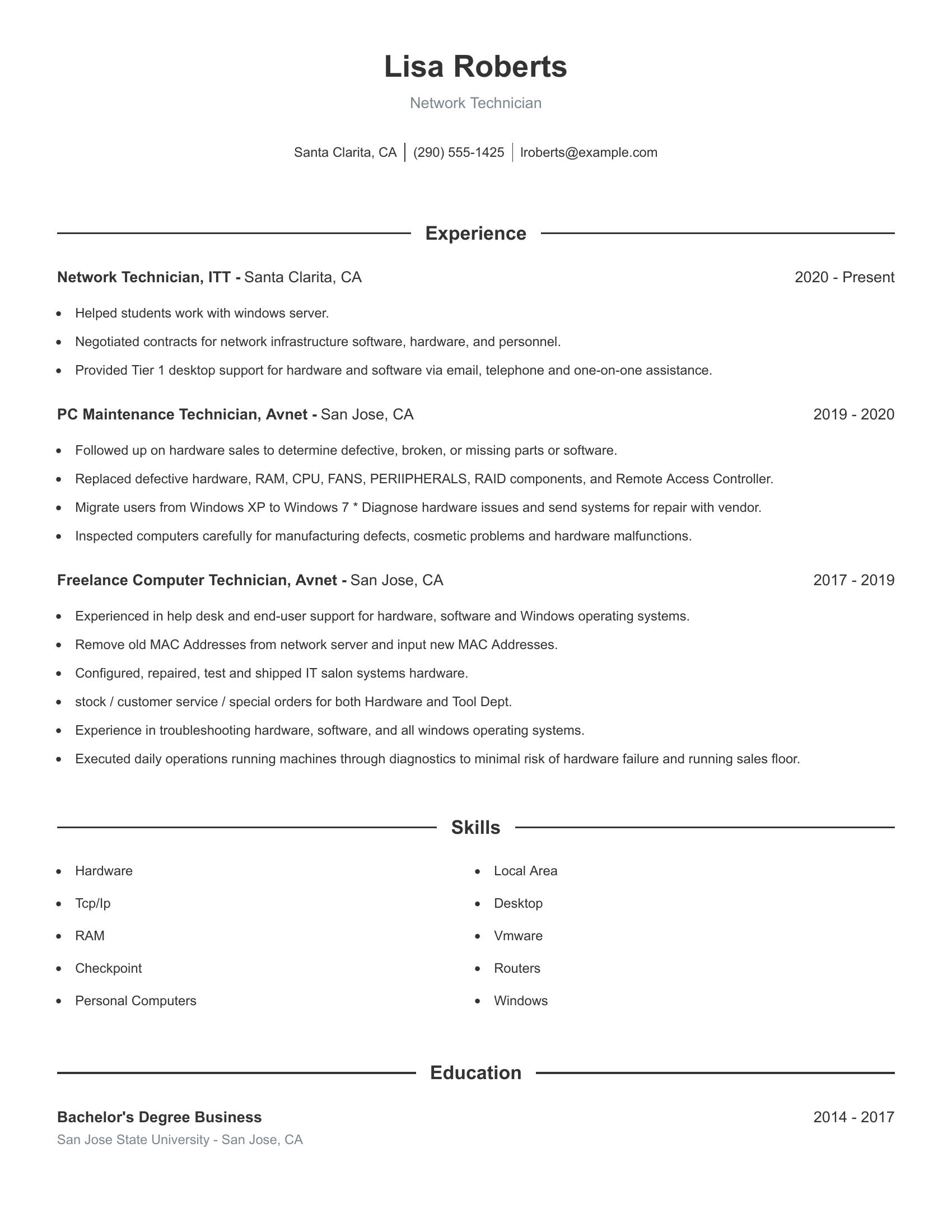
Senior network administrator resumes should highlight technical skills, extensive experience, and specific accomplishments. A good resume includes a clear list of relevant skills such as networking, security, and operating systems. It also showcases detailed employment history with specific roles and responsibilities. Mentioning certifications or education related to computer science strengthens the resume. Quantifiable achievements and involvement in significant projects are important too.
This resume includes specifics such as expertise in Mac routers, Windows, Linux, VoIP, Unix, and Active Directory. The employment history details roles at major companies like IBM, BAE Systems, Amazon, and Microsoft. It mentions significant projects like converting OS/2 to Windows NT Network and managing a global Tivoli environment. The inclusion of a bachelor's degree in Computer Science from the University of Illinois at Chicago further supports the candidate's qualifications.
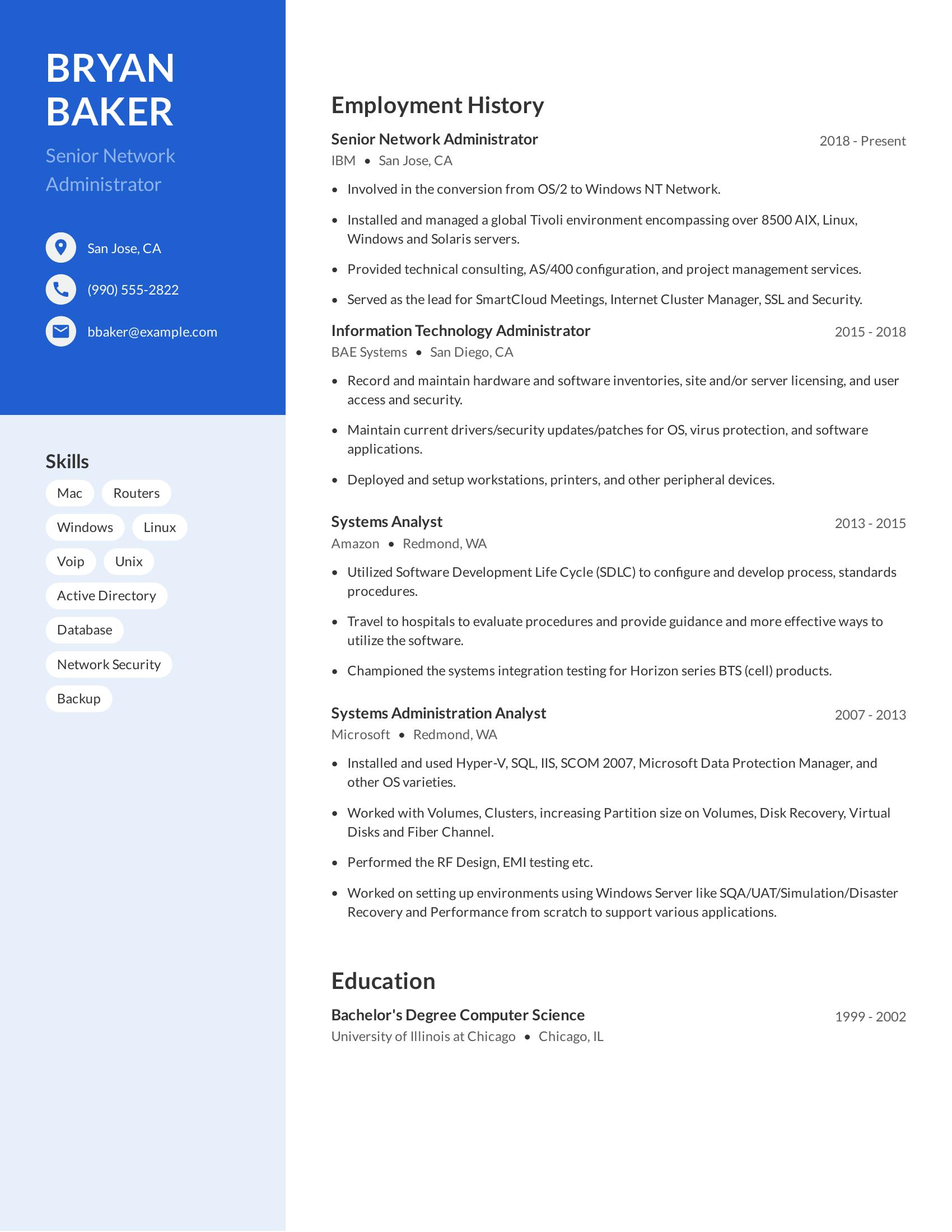
Junior network administrator resumes should include relevant work experience, technical skills, and education. Job roles should reflect hands-on experiences with networking hardware and software. You should list specific tasks like installing and configuring network equipment, managing backups, and providing IT support. Skills in network security, firewall management, and active directory are important. Internships and part-time jobs that demonstrate practical experience are valuable.
This resume includes detailed job experiences that cover critical areas for a junior network administrator. It lists tasks like creating backup systems, configuring hardware, and designing VPN solutions. The candidate's skills section highlights relevant technical abilities such as active directory and network security. The educational background with a degree in computer networking supports the technical competencies mentioned in the work experience.

Network/server administrator resumes should highlight relevant experience, technical skills, and educational background. Key sections include job titles, company names, locations, dates of employment, and detailed bullet points describing responsibilities and achievements. Skills should focus on specific technologies and tools used in network and server administration. Education must list degrees and institutions.
This resume includes all these specifics. It lists job titles clearly with companies, locations, and employment dates. Responsibilities are detailed, showcasing experience with Windows OS security incidents, disaster recovery, UNIX infrastructure, and tape backups. Skills such as Active Directory, Windows virtual machines, and network security are mentioned. The educational background is also provided with the degree and major listed.
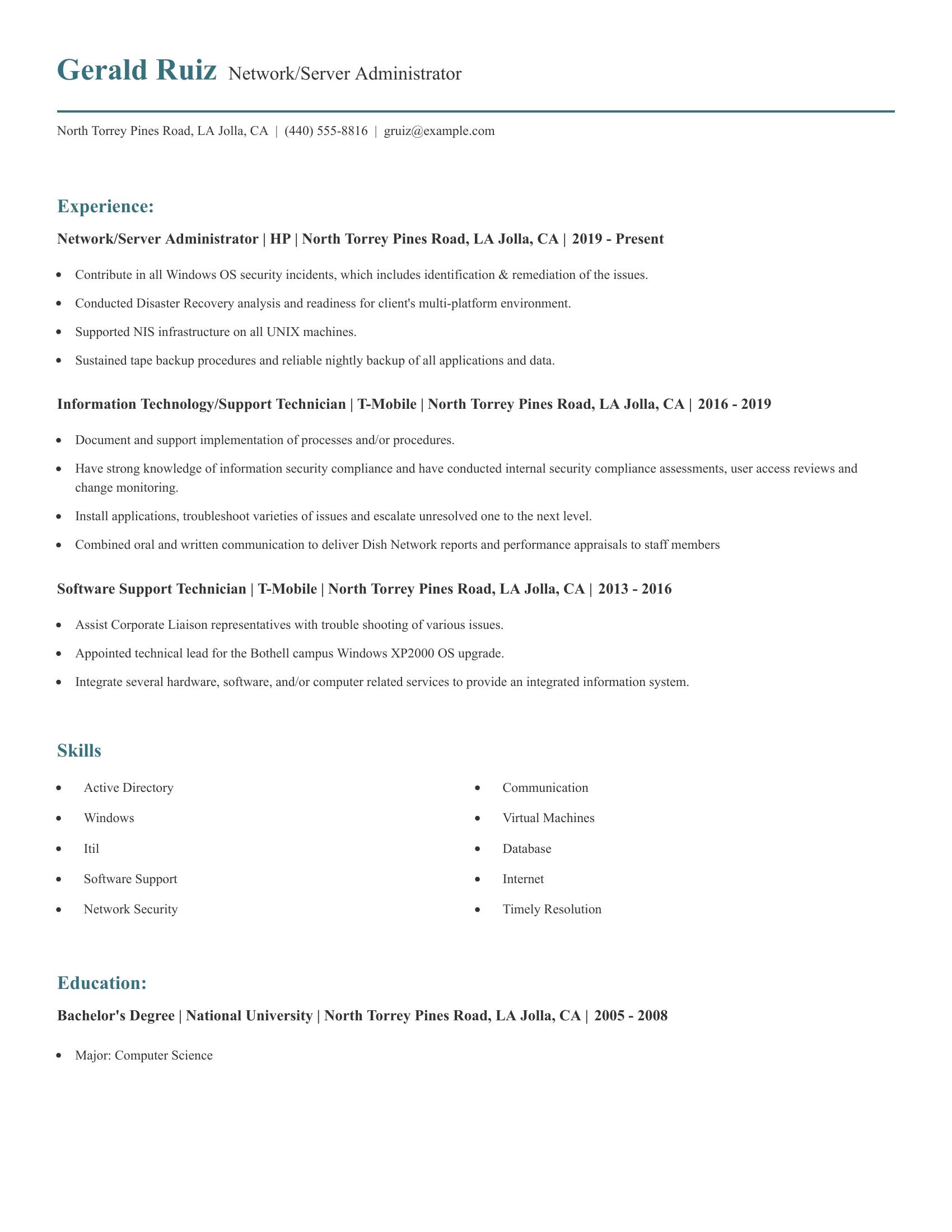
Infrastructure administrator resumes should include clear contact info, a list of relevant skills, job history with dates, and education details. Skills should focus on areas like disaster recovery, network security, and system administration. The job history must show progression and relevant experience. Education should highlight degrees in fields like computer science.
This resume includes a clear contact section and a comprehensive list of skills such as network security and project management. The job history showcases positions at major companies, demonstrating relevant experience from 2015 to the present. Education is detailed with a degree in computer science. Specific tasks and responsibilities are mentioned, providing insight into hands-on experience and technical skills.
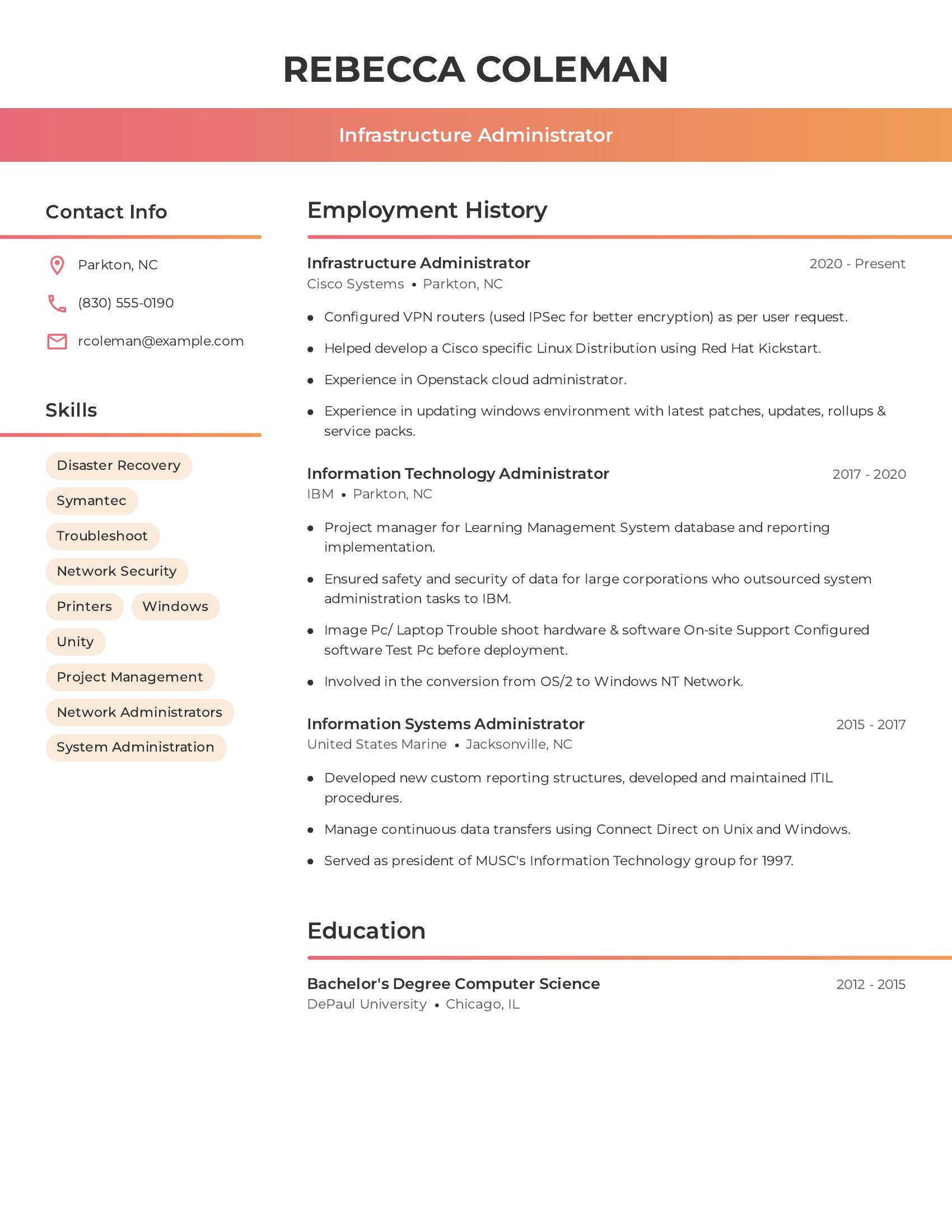
Network engineer technician resumes should highlight technical skills, relevant experience, and certifications. They should list job duties such as managing LAN/WAN networks, performing network security tasks, and configuring email clients. Important skills include system backups, VPN configuration, and network documentation. Contact information and a professional summary are also key components.
This resume includes specific roles and responsibilities across different jobs. It details tasks like providing technical assistance, performing system backups, and configuring network security. The resume also lists experience with various software and hardware tools, showing a strong technical background.
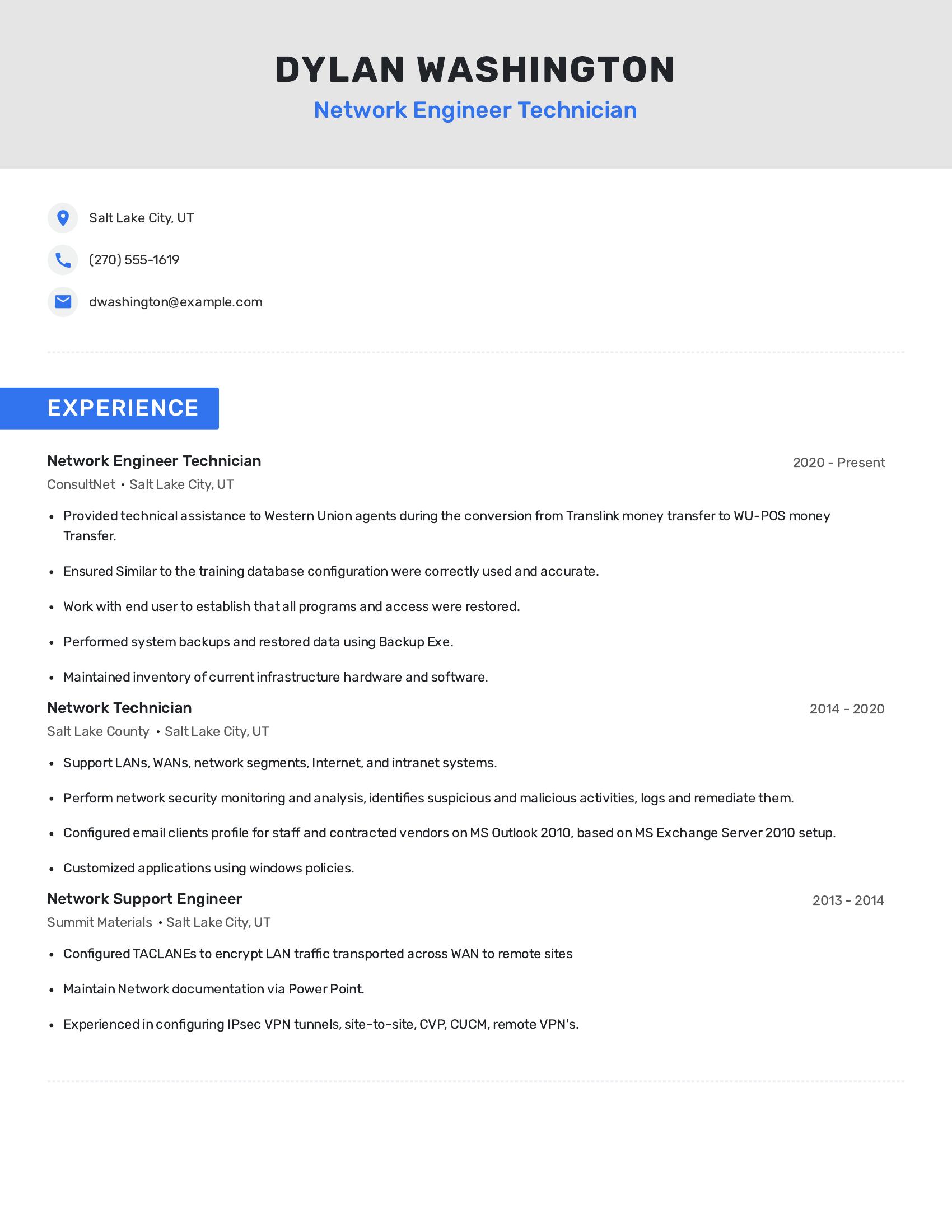
A good network support analyst resume includes specific technical skills, relevant work experience, and education. It should list job titles, companies, locations, and dates of employment. It should describe responsibilities and achievements in previous roles with clear, concise bullet points. Mentioning technical proficiencies and educational qualifications are important for showing expertise and background knowledge.
This resume includes these specifics well. It clearly lists various roles with dates and locations, detailing responsibilities like designing software tools in Java and Unix shell scripts, developing network security policies, and providing hardware support. It also highlights technical skills such as using Oracle and SQL database query tools, configuring enterprise switches, and diagnosing system issues. The inclusion of a bachelor's degree in electrical engineering adds to the educational background.
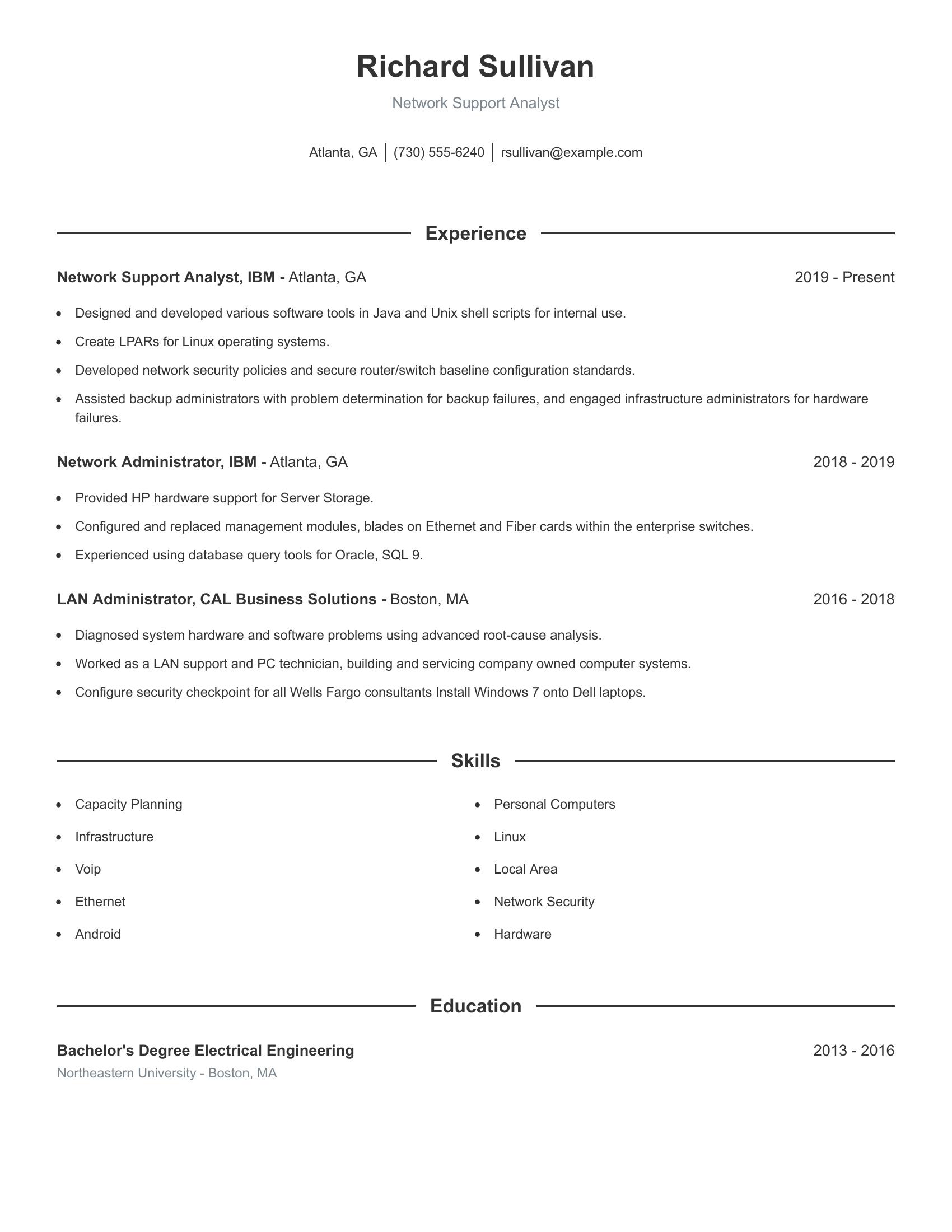
Networking administrator lead resumes should highlight expertise in network configuration, management, and troubleshooting. They should list specific technical skills, relevant work experiences, and contributions to network improvements. The resume should also show familiarity with various operating systems and networking protocols, as well as the ability to handle complex projects and provide technical support.
This resume includes detailed work experiences such as managing LAN/WAN connectivity, configuring remote access, and maintaining DNS and DHCP servers. It shows hands-on experience with VPN setups and server backups. The resume also demonstrates involvement in advanced technology projects and providing customer technical support, showcasing a broad skill set relevant to the role.
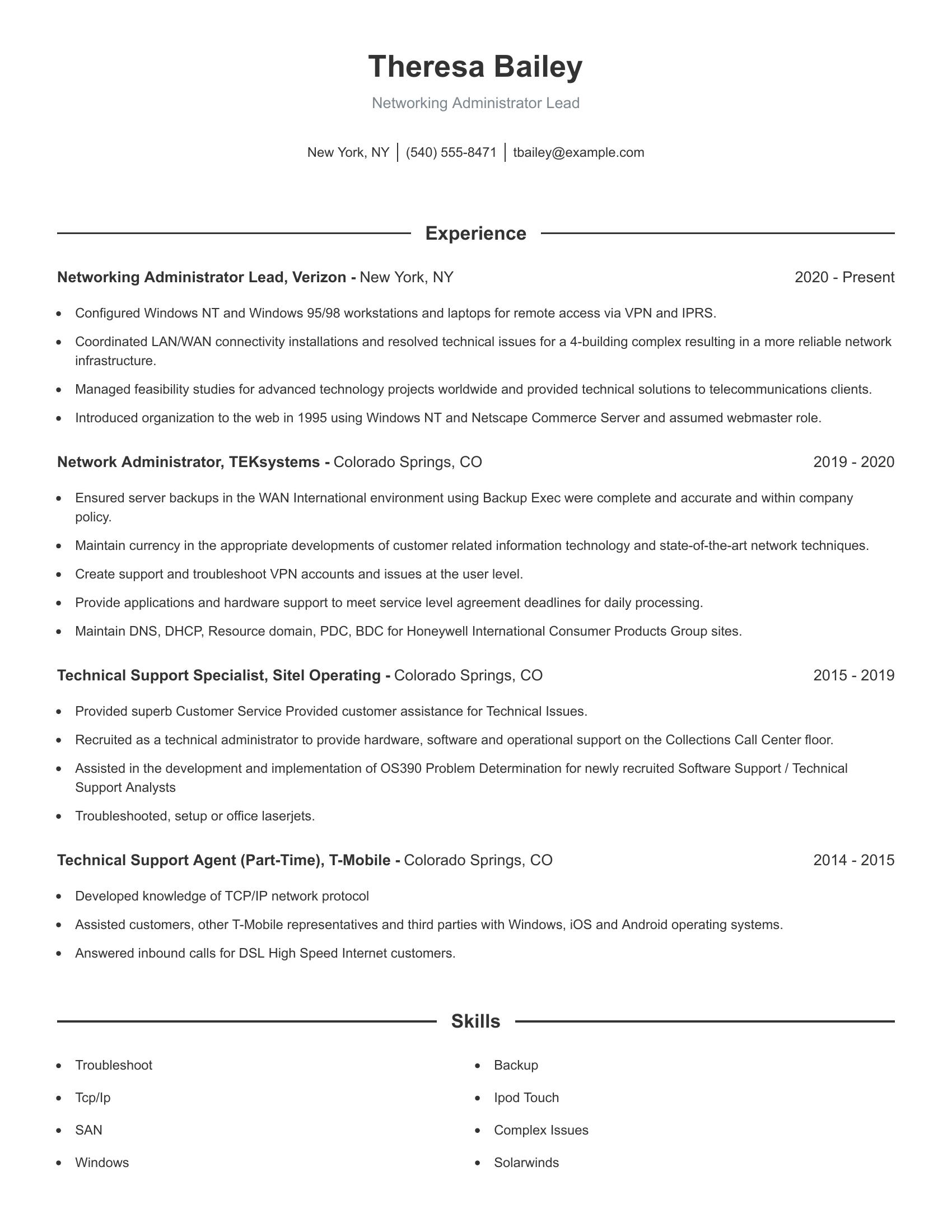
Network consultant resumes should highlight relevant experience, technical skills, and education. Key elements include job titles, employment dates, responsibilities, specific projects, and technical proficiencies. A clear structure with sections for contact info, skills, work history, and education helps employers quickly assess qualifications.
This resume includes valuable information such as contact info, a list of technical skills like network security and disaster recovery, and detailed job experience from multiple roles over several years. It also outlines specific tasks and projects completed in previous positions, showcasing a range of expertise in network management and support. Additionally, the resume lists educational background relevant to the field.
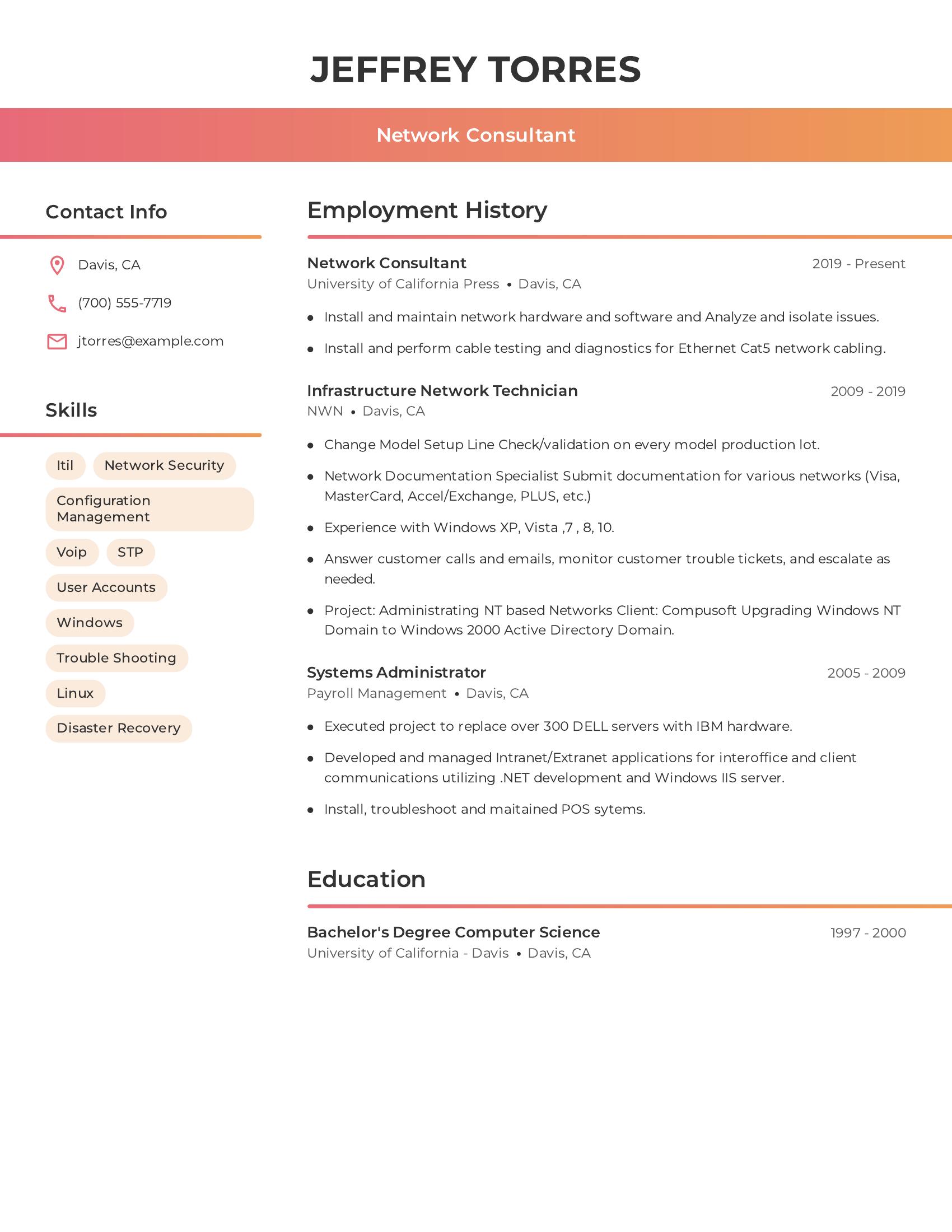
Information technology administrator resumes should highlight hands-on experience with hardware, software, and network troubleshooting. It should detail technical support roles, specific projects like system migrations, and experience with different operating systems. The resume should also list relevant skills such as network security, system troubleshooting, and proficiency with various OS platforms. Education background and contact information are also important components.
This resume includes specific roles in technical support and system migration projects, showing practical experience. It lists relevant skills like network security and troubleshooting. The employment history is detailed, specifying tasks and the environments worked in, such as hospitals and educational institutions. It also provides educational qualifications and contact information.
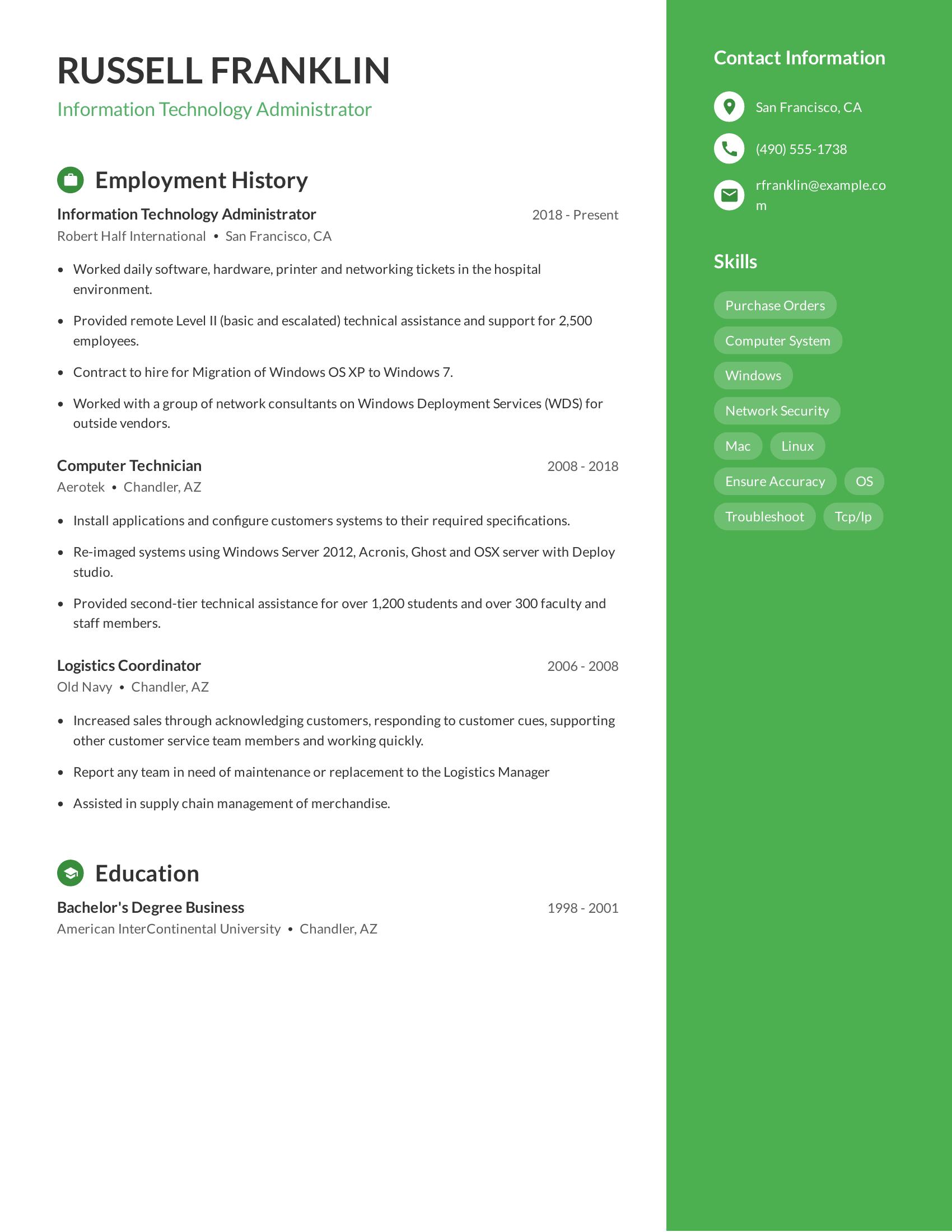
Network systems specialist resumes should highlight relevant work experience, technical skills, and specific accomplishments in network management. They need to show expertise in areas like network connectivity, configuration, monitoring, and security. It's important to include previous job roles, responsibilities, and achievements that demonstrate a strong background in managing network systems and resolving issues. Additionally, listing relevant technical skills such as TCP/IP protocols, LAN/WAN troubleshooting, and project management can be beneficial.
This resume effectively includes the necessary components for a strong network systems specialist resume. It details extensive experience with specific tasks such as performing TCP/IP network connectivity tests, configuring Ethernet LANs, and proactive network monitoring. The resume lists clear job responsibilities and technical skills acquired over several years. It also includes project management experience and supervisory roles, showcasing the candidate's ability to handle complex network systems and lead teams.
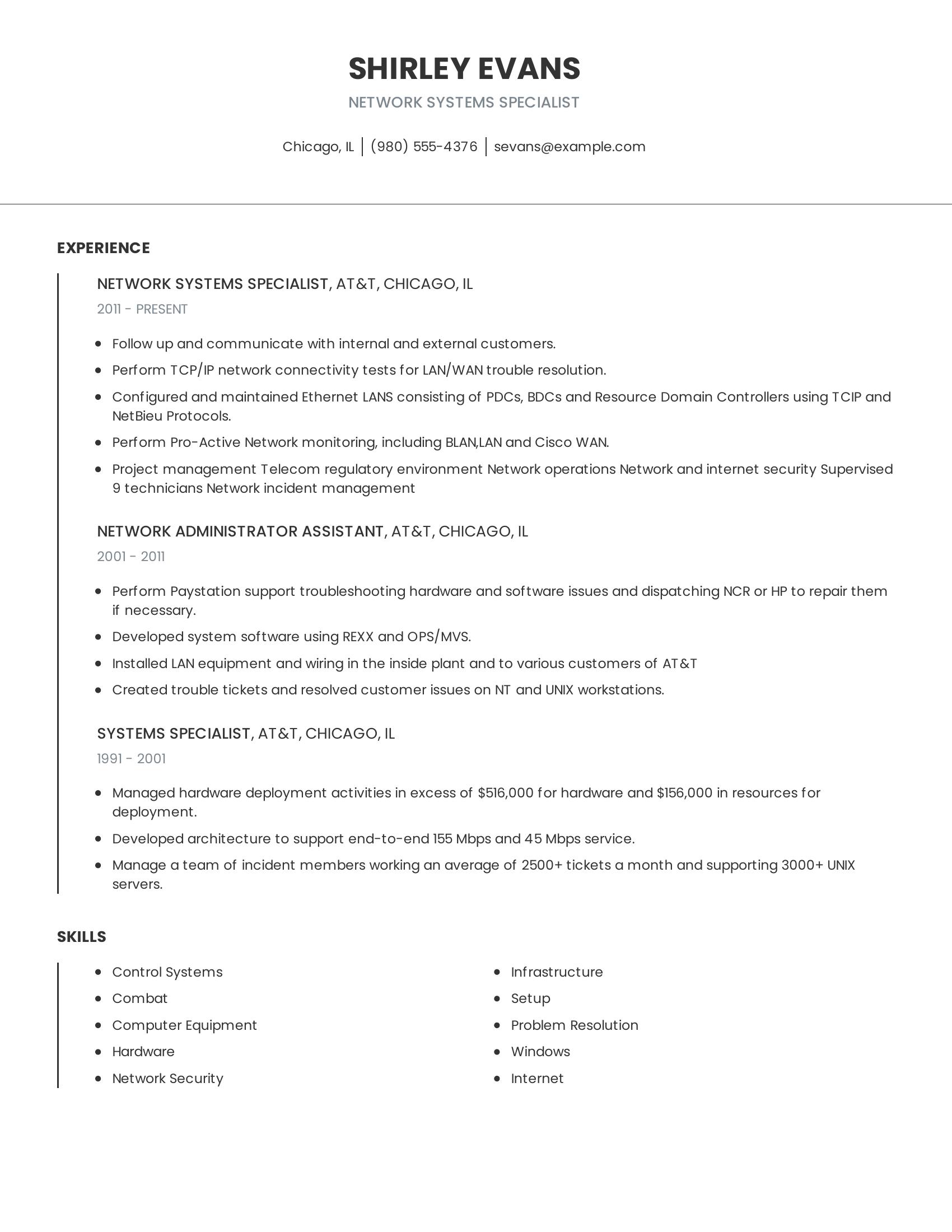
Systems administrator resumes should include work experience, technical skills, and education. The work experience must showcase specific roles and responsibilities, highlighting problem-solving, system configuration, and team leadership. Technical skills should be precise, covering areas like operating systems, software, hardware, and network management. Education details must include relevant degrees that support the technical and administrative aspects of the job.
This resume includes specific job titles and detailed descriptions of tasks performed, such as providing architecture support, configuring systems, and installing hardware. The skills section lists relevant competencies like Linux, troubleshooting, and configuration management. The education section outlines degrees in business, which complement the technical roles with a broader understanding of organizational needs.
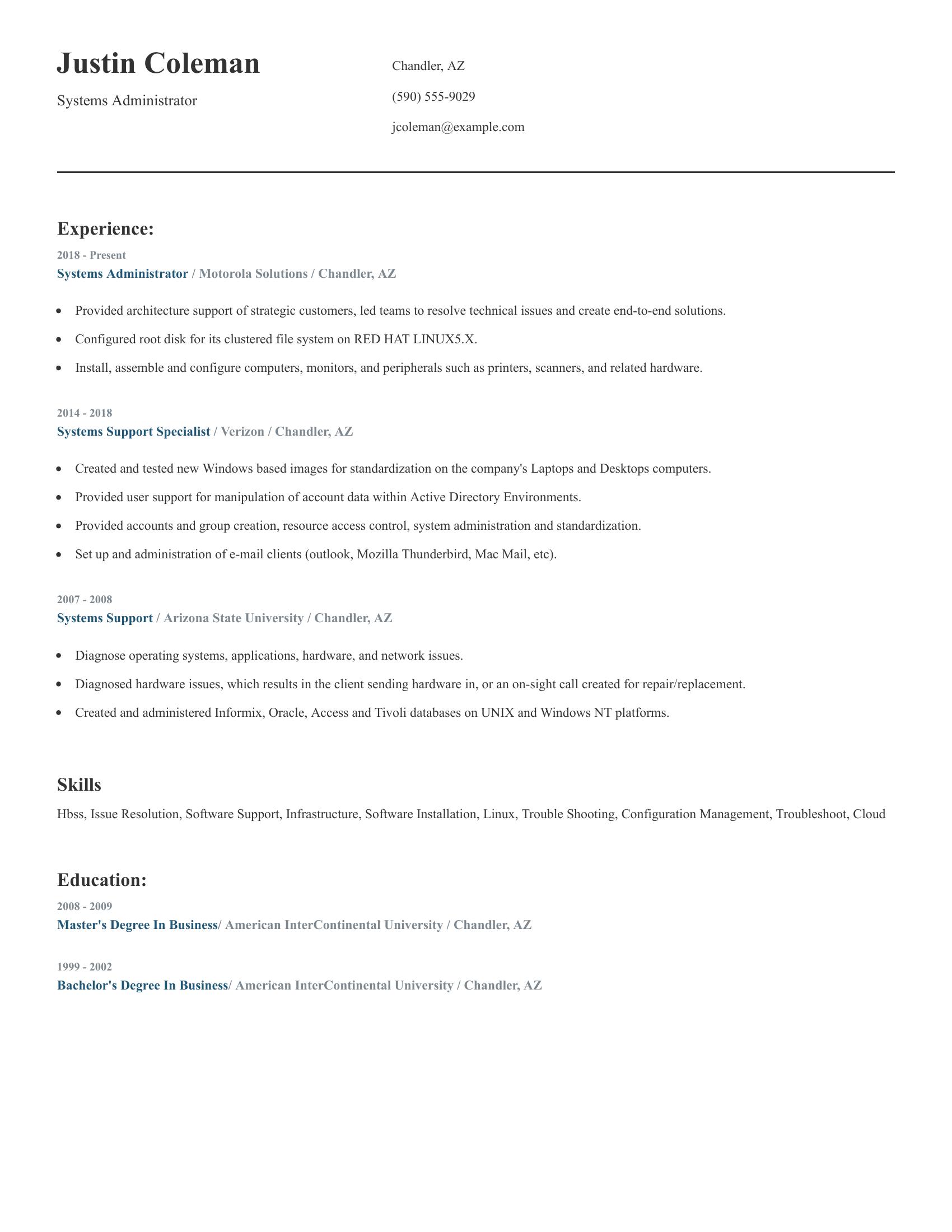
Network administrator internship resumes should highlight relevant experience, technical skills, and educational background. They need to focus on hands-on experience with network management, security measures, and system support. Resumes should also emphasize familiarity with various tools and technologies, as well as the ability to work in a team. Clear and concise descriptions of past internships and projects help showcase practical knowledge and problem-solving abilities.
This resume includes specific experiences such as managing Active Directory, implementing network security measures, and supporting critical projects. The candidate's internships at reputable organizations demonstrate a solid foundation in network administration. Skills listed like Windows, Linux, and network security are directly relevant to the role. The education section shows a bachelor's degree in computer information systems, which supports their technical background.
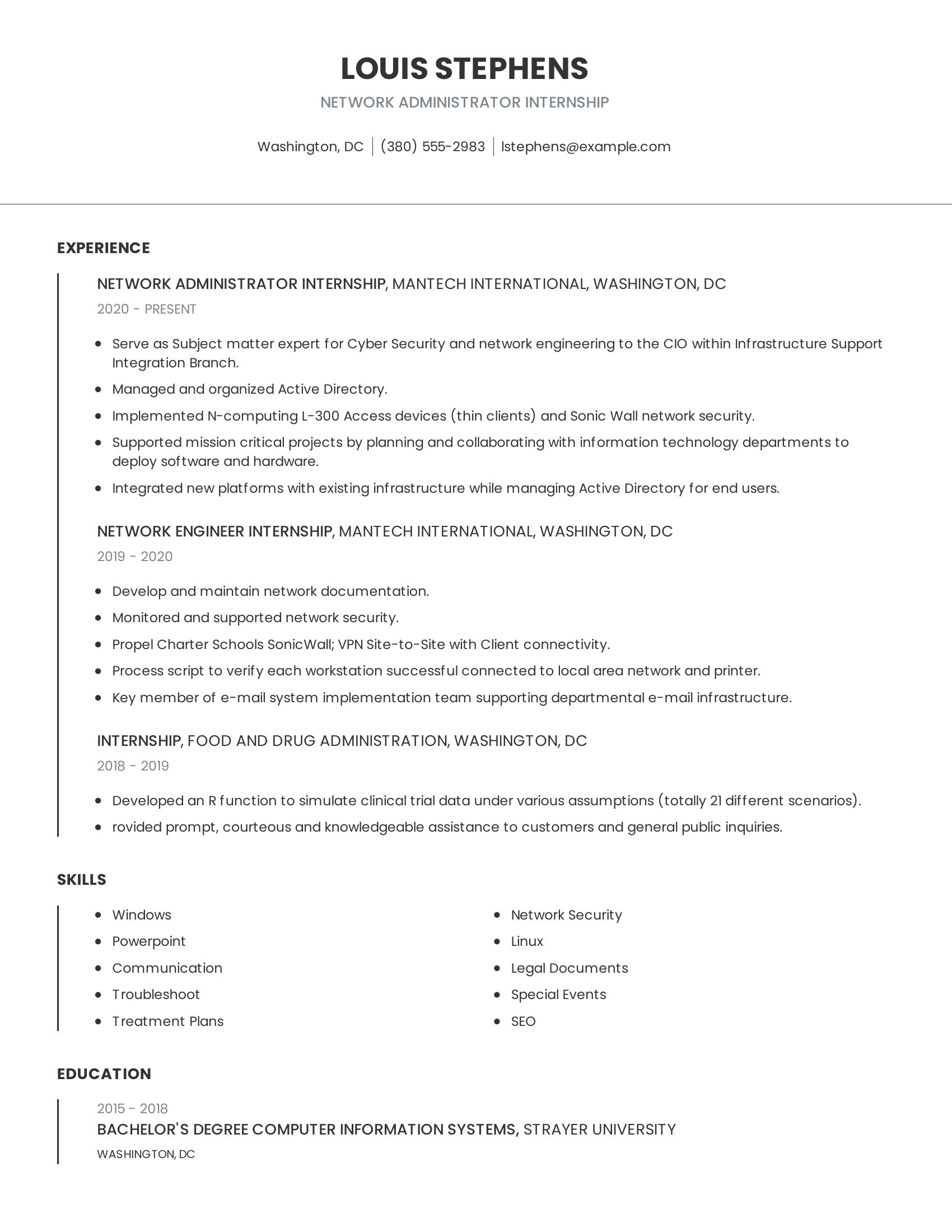
Network manager resumes should focus on technical skills, experience with diverse network systems, and leadership abilities. They should include job titles, company names, locations, dates of employment, and detailed descriptions of duties. Highlighting specific technologies, protocols, and software used is crucial. Emphasize problem-solving skills, project management experience, and the ability to streamline and secure network operations.
This resume includes relevant job titles like network manager and senior network engineer, showing a clear career progression. It lists specific tasks such as configuring SNMP TACACS, testing network security, and firewall checks. The resume mentions multiple operating systems like AS400, Windows, and Linux. It also shows hands-on experience with Oracle RAC, Red Hat Enterprise Linux, VMware, and Solaris. These details effectively demonstrate the candidate's comprehensive technical background and leadership skills.
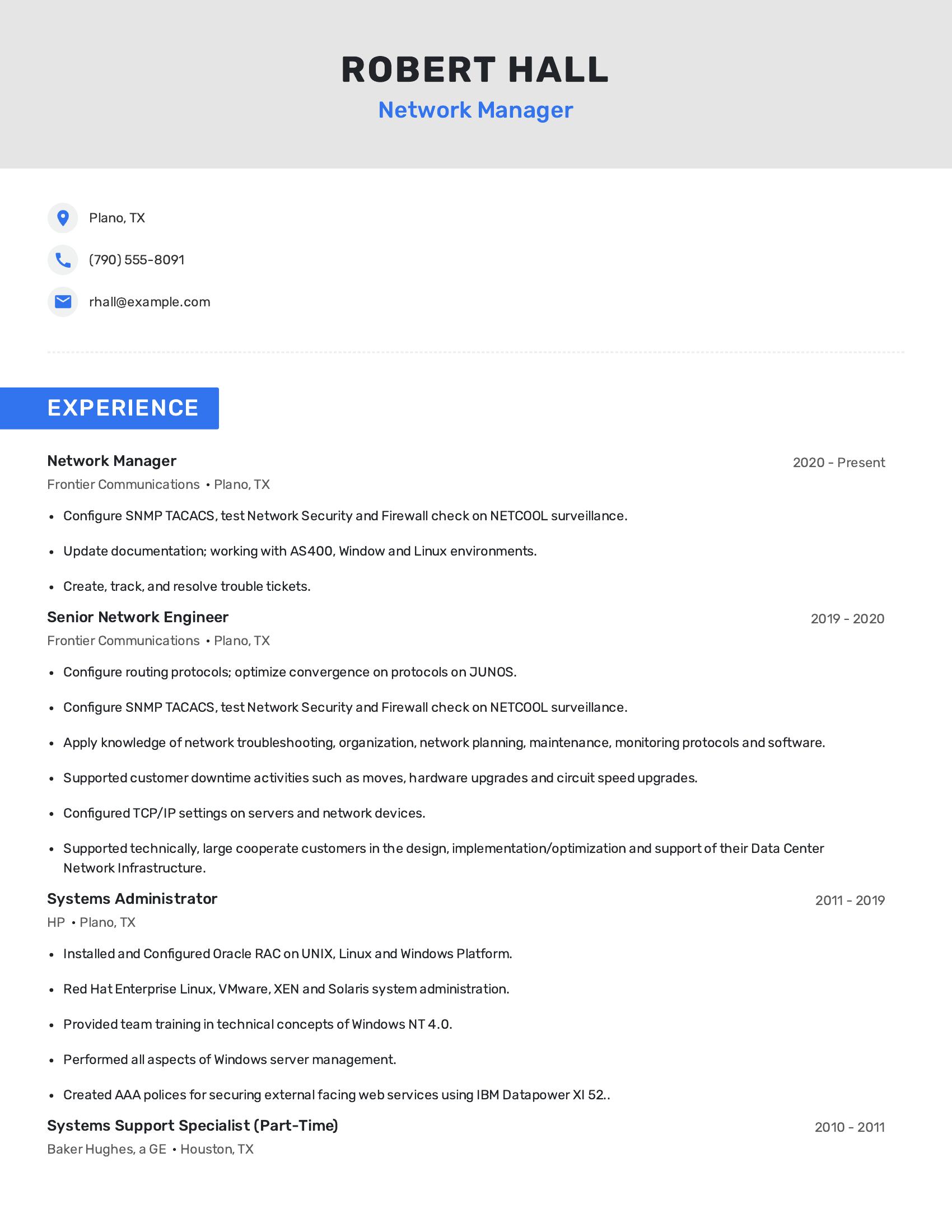
A good network support technician resume includes contact information, technical skills, employment history, and specific job responsibilities. It should highlight experience with network management, troubleshooting, hardware and software support, and security measures. Including measurable achievements and specific technologies used adds value.
This resume includes contact info, a list of relevant technical skills like Active Directory and hardware support, and detailed job histories with clear responsibilities. It shows experience in network issue resolution, user training, and system security. The resume also notes specific accomplishments such as reducing setup time and deploying new technologies.
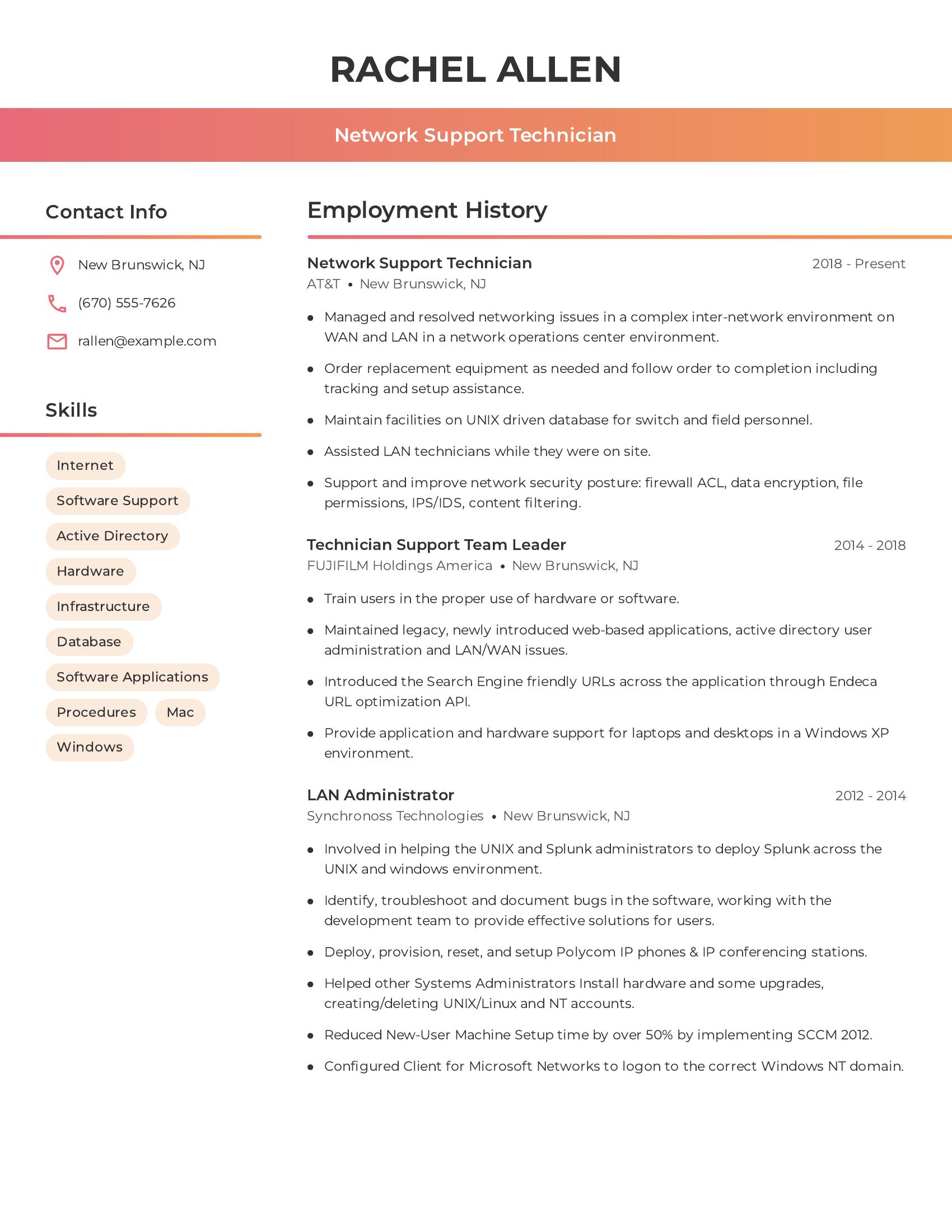
A technical systems engineer resume should highlight experience in system design, implementation, and administration. It should cover technical skills like proficiency in operating systems, networking, and software tools. Listing specific projects and tasks such as network refreshes, system integrations, and technical interviews is beneficial. Education and relevant certifications should also be included to demonstrate foundational knowledge and continuous learning.
this resume includes many of these elements. It outlines experience with fiber infrastructure design, technical interviews, and system administration across different operating systems like Linux and Windows. The resume also details specific roles at prominent organizations, demonstrating a solid career history. Additionally, it lists relevant educational background in electrical engineering.
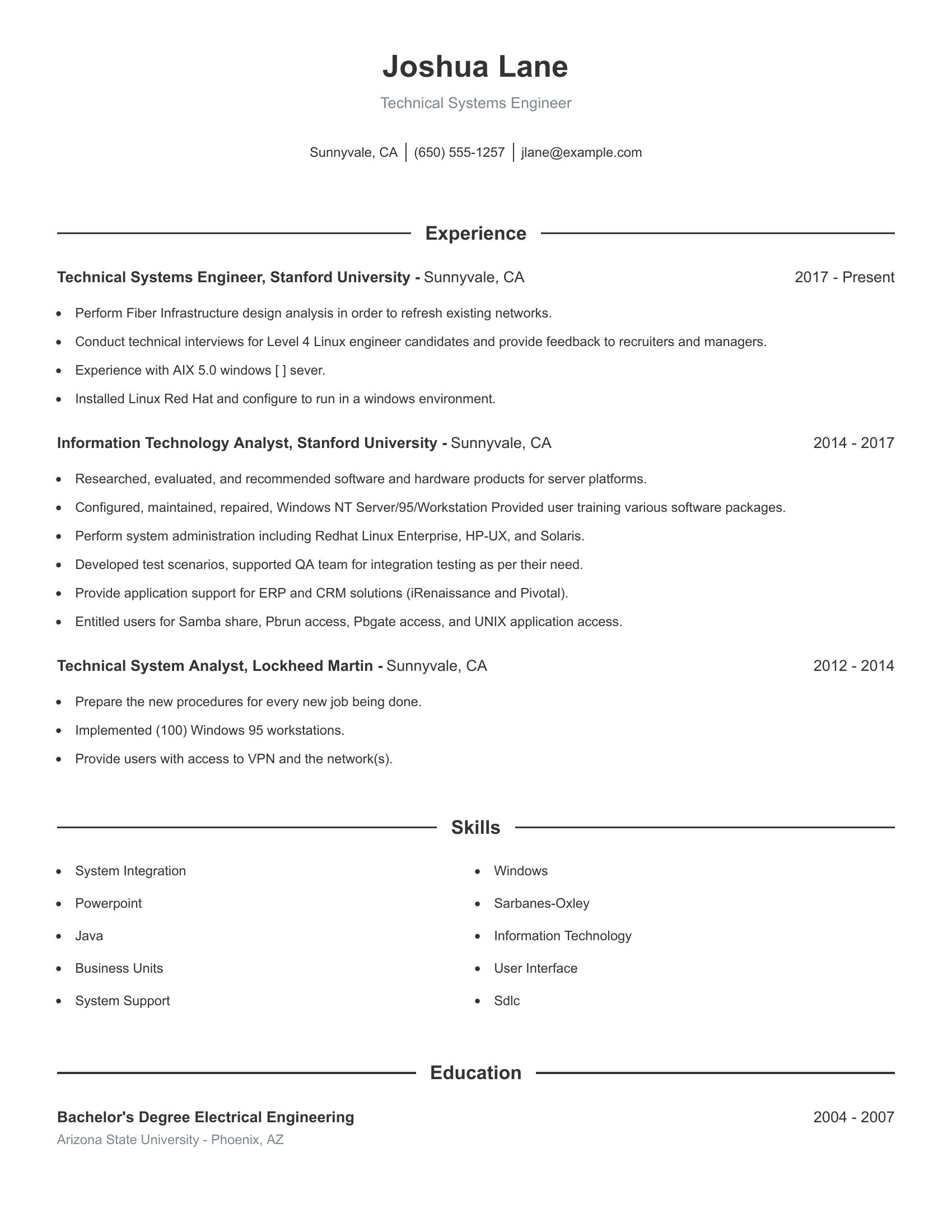
Highlight Certifications. Mention certifications like CompTIA Network+, CCNA, or MCSE to stand out.
Show Technical Skills. List skills such as network troubleshooting, firewall management, and VPN configuration.
Include Metrics. Use numbers to show achievements, like reducing downtime by 20% or managing networks for 200+ users.
A network administrator's resume should highlight technical skills, certifications, experience, and education. This helps show the ability to manage and maintain network systems. List relevant technical skills, specific certifications, and past job roles. Include education that supports your understanding of networking.
A good network administrator summary should highlight your skills, experience, and achievements. Focus on what you do, how long you've done it, and your results.
Use direct language and focus on your professional strengths. Keep it short and relevant to the job you're applying for.
A strong network administrator experience section should highlight specific responsibilities and achievements in managing and maintaining network systems. Use action verbs and quantifiable results.
Focus on technical skills, problem-solving abilities, and achievements. Use bullet points for clarity.
Network administrators need technical skills to manage and troubleshoot computer networks.
Soft skills help network administrators communicate effectively and manage their work environment.